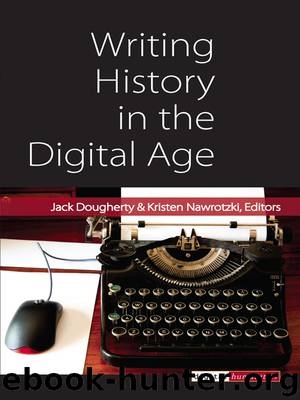Writing History in the Digital Age by Dougherty Jack & Nawrotzki Kristen

Author:Dougherty, Jack & Nawrotzki, Kristen
Language: eng
Format: epub
Publisher: The University of Michigan Press
Published: 2018-05-15T00:00:00+00:00
Notes
1. McNeill quoted in Tracy L. Steffes, “Lessons From the Past: A Challenge and a Caution for Policy-Relevant History,” in Clio at the Table: Using History to Inform and Improve Education Policy, ed. Kenneth Wong and Robert Rothman (New York: Peter Lang, 2008), 267–68; Stephen Ramsay, “The Hermeneutics of Screwing Around; or What Do You Do with a Million Books” (paper delivered at the conference “Playing with Technology in History,” History Education Network/Histoire et Éducation en Réseau, Niagara-on-the-Lake, Canada, April 2010), http://www.playingwithhistory.com/wp-content/uploads/2010/04/hermeneutics.pdf.
2. Ansley T. Erickson, “Schooling the Metropolis: Educational Inequality Made and Remade, Nashville, Tennessee, 1945–1985” (PhD diss., Columbia University, 2010), http://faculty.tc.columbia.edu/upload/ate11/Erickson_TitlePage&Abs_DEP.pdf.
3. A relational database keeps bits of information in relationship to one another without establishing hierarchies. In my database, as discussed in this essay, each source was related to multiple notes, yet I could also search across notes from multiple sources. More elaborate uses of relational databases can include specifying types of relationships between sources or analyzing the density of relationships between attributes of the database so as to discern patterns that may not be otherwise apparent.
4. Consider other examples of database technology in historical writing, such as the archival collection as database (full-text searchable to facilitate text mining) or the database as scholarly product. See Jean Bauer, The Early American Foreign Service Database, 2010, http://www.eafsd.org/.
5. See, for example, Peter Burke, A Social History of Knowledge: From Gutenberg to Diderot (Cambridge: Polity, 2000); Ann Laura Stoler, Along the Archival Grain: Epistemic Anxieties and Colonial Common Sense (Princeton: Princeton University Press, 2010); Antoinette Burton, ed., Archive Stories: Facts, Fictions, and the Writing of History (Durham: Duke University Press, 2005); Joan M. Schwartz and Terry Cook. “Archives, Records, and Power: The Making of Modern Memory,” Archival Science 2 (2002): 1–29.
6. For views of this problem, see Steffes, “Lessons,” 267–68; Amanda Seligman, comment on “Historical Research and the Problem of Categories,” in Writing History in the Digital Age, web-book ed., Fall 2011 version.
7. For one recent example, see Amanda Morton, “Review of Digital Tools: Zotero and Omeka,” Journal of American History 98, 3 (2011): 952, http://jah.oxfordjournals.org/content/98/3/952.
8. FileMaker Pro, http://www.filemaker.com; NVivo, http://www.qsrinter-national.com/products_nvivo.aspx; ATLAS.ti, http://www.atlasti.com/; Zotero, http://www.zotero.org. New options include DevonThink and Adobe Lightroom, discussed in the “History and the Digital Image Forum,” Perspectives (October 2012), http://www.historians.org/perspectives/issues/2012/1210/index.cfm.
9. You can download my FileMaker template at http://faculty.tc.columbia.edu/upload/ate11/Erickson_FMTemplate.fp7.
10. Kirklin Bateman et al., “Taking a Byte out of the Archives: Making Technology Work for You,” Perspectives, January 2005, http://www.historians.org/perspectives/issues/2005/0501/0501arc1.cfm;. Page 145 → Konrad Lawson, “The Articulated Arm of an Archive Raider,” Chronicle of Higher Education, ProfHacker, December 7, 2010, http://chronicle.com/blogs/profhacker/the-articulated-arm-of-an-archive-raider/29243.
11. Lynn Hunt argues for a similar approach, encouraging scholars not to delay writing by organizing notes or other getting-ready activities, as well as to use writing to further thinking, in “How Writing Leads to Thinking (and Not the Other Way Around),” Perspectives, February 2010, http://www.historians.org/perspectives/issues/2010/1002/1002art1.cfm. Digital note keeping helps earlier and more fluid writing, as the accessibility of information reduces barriers between getting ready and actually writing. James B. McSwain shared a similar story about his experience with Nota Bene in Writing History: How Historians Research, Write, and Publish in the Digital Age, ed.
Download
This site does not store any files on its server. We only index and link to content provided by other sites. Please contact the content providers to delete copyright contents if any and email us, we'll remove relevant links or contents immediately.
Cecilia; Or, Memoirs of an Heiress — Volume 1 by Fanny Burney(32558)
The Great Music City by Andrea Baker(32018)
Cecilia; Or, Memoirs of an Heiress — Volume 2 by Fanny Burney(31956)
Cecilia; Or, Memoirs of an Heiress — Volume 3 by Fanny Burney(31940)
We're Going to Need More Wine by Gabrielle Union(19045)
All the Missing Girls by Megan Miranda(16023)
Pimp by Iceberg Slim(14506)
For the Love of Europe by Rick Steves(14121)
Bombshells: Glamour Girls of a Lifetime by Sullivan Steve(14072)
Talking to Strangers by Malcolm Gladwell(13370)
Norse Mythology by Gaiman Neil(13363)
Fifty Shades Freed by E L James(13239)
Mindhunter: Inside the FBI's Elite Serial Crime Unit by John E. Douglas & Mark Olshaker(9339)
Crazy Rich Asians by Kevin Kwan(9290)
The Lost Art of Listening by Michael P. Nichols(7506)
Enlightenment Now: The Case for Reason, Science, Humanism, and Progress by Steven Pinker(7311)
The Four Agreements by Don Miguel Ruiz(6763)
Bad Blood by John Carreyrou(6621)
Weapons of Math Destruction by Cathy O'Neil(6279)
